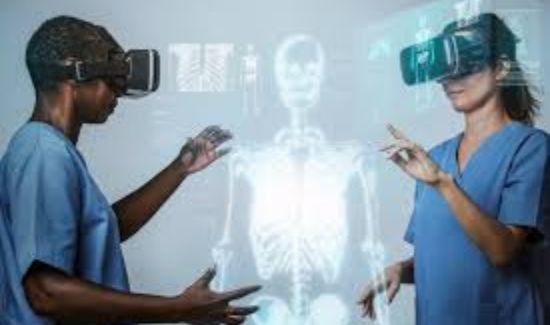China recently unveiled its innovative AI hospital to the world, redefining the way healthcare is delivered by fusing state-of-the-art artificial intelligence (AI) and immersive virtual reality (VR) technologies. This development represents a significant advancement for the global healthcare scene.
This ground-breaking facility, which stands at the nexus of innovation and compassion, not only demonstrates China’s dedication to technical innovation but also provides an outlook on the direction that world healthcare is taking.
Table of Contents
An Emerging Healthcare Era:
The idea of an AI hospital signifies a radical change in the way that healthcare is viewed, accessed, and provided. The days of lengthy wait times, geographical restrictions, and uniform treatment methods are long gone. Rather, patients are invited into a world where virtual environments and AI algorithms work together to offer accessible, effective, and individualized healthcare treatments.

Using Artificial Intelligence to Its Full Potential:
Sophisticated AI algorithms that evaluate enormous volumes of medical data to help healthcare providers with diagnosis, therapy planning, and patient monitoring are the foundation of the AI hospital. These algorithms are trained to detect patterns, spot abnormalities, and anticipate outcomes more accurately and efficiently than a human could.
Healthcare providers can use AI to speed up diagnosis, customize treatment plans for each patient, and even anticipate possible health problems before they manifest.
Complete Immersion VR Experiences:
The immersive virtual reality architecture of the hospital accentuates its AI-driven backend. Patients can receive medical procedures, participate in therapy sessions, and have virtual consultations with healthcare providers—all from the comfort of their own homes—thanks to virtual reality technology.

By encouraging a sense of empowerment and engagement, this not only reduces waiting periods and does away with the need for physical travel, but it also improves the whole patient experience.
Remote Procedures and Consultations:
One of the main components of the AI hospital concept is virtual consultations, which provide patients with unparalleled access to medical treatment no matter where they live. Without the need for in-person visits, people can communicate with healthcare providers in real-time using video conferencing platforms and virtual reality interfaces. They can discuss symptoms, see test results, and receive medical advice.

Additionally, patients can endure complicated surgeries under the supervision of qualified professionals through remote procedures carried out by surgeons in virtual settings, which minimizes the need for travel and lowers the danger of complications.
Data-Driven Insights and Personalized Medicine:
The AI hospital’s ability to provide individualized medical care through data-driven insights is among its most revolutionary features. AI systems are able to create personalized treatment regimens that are ideal for every patient by examining enormous databases of patient data, including genetic data, medical histories, and lifestyle variables.
In the end, this precision medicine strategy leads to higher patient satisfaction and overall healthcare efficacy by minimizing the likelihood of adverse responses and improving treatment outcomes.
Regulatory Frameworks and Ethical Issues:
Healthcare powered by AI has enormous potential benefits, but there are also important ethical and legal issues to take into account. To guarantee that the use of these technologies is ethical, transparent, and egalitarian, concerns including algorithmic bias, patient privacy, and data security must be carefully considered.
Strong legal frameworks must also be put in place to control how AI is used in healthcare settings, protecting against possible exploitation or abuse of these potent instruments.
Global Consequences and Outlook for the Future:
With significant ramifications for the international medical community, the opening of China’s AI hospital is a turning point in the development of healthcare. Similar institutions will probably spring up all over the world as other countries take note of this innovative initiative’s accomplishments and difficulties, changing the face of healthcare delivery for years to come.
Future developments in artificial intelligence (AI), virtual reality, and medical robotics could completely transform how we think about and practice medicine.
Conclusion:
To sum up, the opening of China’s AI hospital is a huge step forward in the effort to use technology for the benefit of people. Through the utilization of artificial intelligence and virtual reality, this establishment has cleared the path for a time when healthcare will not be restricted by geographical boundaries or administrative difficulties.
As we venture into the realm of virtual healthcare, let us seize the chances presented by AI and VR to build a more accessible, equitable, and healthy environment for everybody.

